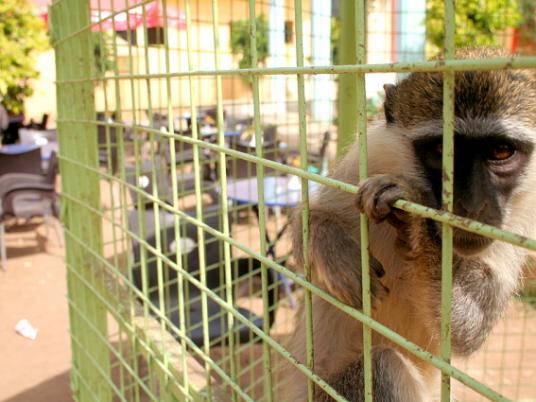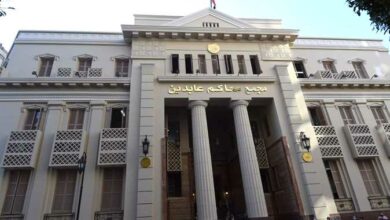
The trade of wild, exotic animals sold in Cairo pet shops has boomed, at least according to animal welfare activists. As it does, it has agitated a growing animal rights scene, illuminating stark differences in ideas about the proper treatment of animals.
At a pet shop on Qasr al-Nil Street, in a busy commercial district, the dogs don’t bark, the birdcages drip with feces, and a monkey stares down with perfectly round eyes. The monkey is LE5,000, another one will cost LE8,000, and an out-of-sight “brown monkey from Africa” will cost LE15,000.
You can order any kind of animal you like, the owner promises.
In contrast to the rundown appearance of the shop, the business discussion is brisk and professional. The owner says he goes to a breeding place on the Cairo-Alexandria Road every day. You name the animal, and he will fetch it for you that same day. If you don’t know the name, you can bring a photo. If you go on holiday, he will buy the animal back. If you want to travel with the animal, he can arrange all the paperwork.
A pet shop advertising on Facebook promises to deliver a lion cub in 25 days. “Message me your email,” says the owner over the phone. “I’ll send photos.”
The Cairo black market animal trade is hardly surprising. Pet shops like the one on Qasr al-Nil have been doing business for years. At the infamous, ancient Souq al-Goma’a, red-eyed falcons, boxes of snakes, solitary chameleons, endangered Egyptian tortoises, coral sea fish, and a hundred other kinds of animals are sold alongside furniture and shower scrubs.
Wild animal trade is banned under the Convention on International Trade in Endangered Species of Wild Fauna and Flora (CITES). Although Egypt is a signatory, it is also known as one of the largest markets in the world for the banned wildlife trade, which is estimated to be the second largest illegal trade in the world, behind drugs. It’s somewhere on par with human trafficking and arms trafficking.
Just over the river from Qasr al-Nil, satin-coated Alsatians and clipped poodles are trotted about the exclusive Gezira Sporting Club. Two Zamalek pet shops have closed in recent months; the neighboring residents complained about the stench of urine and food, and about the poor treatment of the animals, according to shop owners.
At the last surviving Zamalek pet shop — a clean, well-lit place on 26th of July Street — the owner wrinkles her nose with disgust at a tentative enquiry about buying a chimpanzee. She knows a place, she says, that has a rabbit.
As well as having dog walkers, up-market, affluent Zamalek is also home to a disproportionate number of animal activists. Predominantly young and well-educated, they have struggled to shake a reputation for being privileged members of an educated elite, imposing a foreign, “Western” morality. The animal rights scene, though still small, is growing; perhaps riding the coattails of the renewed talk of human rights.
At the same time, says prominent animal rights activist Dina Zulfikar, there is a countervailing trend toward conspicuous ownership of wild animals: restaurants featuring chimpanzees, home owners putting up lions, hotels with private petting zoos.
One problem, she says, is that opening a pet shop requires no specific qualifications. The application goes through city council as a “decoration items store.” It then makes economic sense for the owners to diversify from domesticated animals to lucrative sales of rare, wild, endangered species. A baby chimpanzee will cost up to LE50,000, while a Rottweiler puppy is about LE3,000.
Zulfikar also says there is little oversight from the bodies tasked with enforcing CITES: the ministries of Agriculture and Environment’s respective wildlife units. “The offices do nothing. There is no Facebook page, no pamphlets about what animals are legal and what animals are not.”
As a result, illegal trade happens almost in the open. The Qasr al-Nil pet shop is just a five minute walk from Tahrir Square, in the shadow of government ministry offices.
Reports of the increase in illegal animal trade are necessarily anecdotal, lacking hard statistics. But one way to measure may be to look at the number of confiscations. The Middle East Regional Director of the International Fund for Animal Welfare (IFAW), Dr. Elsayed Mohamed, told Egypt Independent that Cairo customs has reported an increase in attempts to smuggle wild animals through the airport. Smugglers may be targeting Cairo following the country’s political unrest, he says.
Egypt, he says, is mainly a transit point. Africa’s abundant wildlife is funneled into the country, and then sold to buyers “mainly from the Far East.”
“In general, in any country, when there is conflict, the wildlife becomes one of the victims,” Mohamed says. “I can say the enforcement of CITES can be improved by the Egyptian authorities, but considering the circumstances in Egypt now, I think they are doing an acceptable level of work. Always we have had a problem with enforcement in the Middle East.”
A potential security vacuum aside, the UAE-based director says the IFAW has also noticed an increase in the popularity of exotic pets, including dangerous species, in the Gulf countries.
The trade of chimpanzees through Cairo is the subject of a 2006 documentary by the renowned photographer and videographer Karl Amman. The chimpanzees are known as “bushmeat orphans:” their parents have been hunted and skinned in the jungles of Cameroon. The young primates are drugged with cough syrup and flown to Cairo in perforated wooden crates. The documentary names a woman, “Heba,” as the mastermind of the Cameroon-Cairo chimpanzee trade.
But Dr. Omar Tamam, a veterinarian and assistant professor at Monufiya University, tells a very different story. He says the trade of primates has completely stopped in the last five years. As one of Egypt’s leading primate vets, he treats sick pet chimps and is well placed to judge the number of the animals being kept behind closed apartment doors. “When I get a phone call, I don’t ask questions about whether they have the right certificate. I know if I did they wouldn’t call and the animal would die.”
In recent years, he says, the phone calls have stopped. He cites this as evidence chimpanzee ownership is also in decline. The Egyptian Army also patrols the Libyan border more closely now, he says, and they have put a halt to chimpanzee smuggling.
“Heba is in a Nigerian jail,” he adds. “She has been there for three years."
What Zulfikar and Tamam can agree on, however, is the central position of Giza Zoo in the trade of wild animals. When a CITES official confiscates an animal, it is delivered to the national zoo, which is notorious for its dilapidated animal-pens and was expelled from the World Association of Zoos and Aquariums in 2004.
“Taking a chimpanzee from a home and putting it in the zoo is like taking it from a five-star hotel and putting it in jail,” Tamam says. “Most die of stress.”
Given this, keeping a wild animal in a carpeted, air-conditioned apartment may appear the more humane course of action — midway between the horrors of the pet shop and the life-sentence of the zoo. Lavishing a wild animal with modern comforts could be a kind of animal welfare, albeit very different from the one proposed by most welfare activists.
Zulfikar has recently launched an online petition calling for CITES to name a new director, as the current one is also the Giza Zoo director. “There is a conflict of interest,” she says.
Facilities breeding CITES-listed animals need a permit from the CITES office. But the zoo breeds and sells animals to the facilities, so it’s in the interests of the zoo director, she says, to have lots of facilities.
“Then if I report an illegal trade, it goes to the zoo. The animal is then sold again, to a facility. It’s part of a circle.”
By 16 May, after three days, the petition had 195 signatures. But the vast majority were foreigners; Minnesotans and New Zealanders weighing in on the correct appointment of a Cairo official.
It was a strange, telling example of the way the plight of animals tends to override the usual barriers we put up to getting involved in other people’s business.
Those operating zoos, circuses, pet shops, campaigning for animal rights can seem anything from effete to obscene. Surely there are far more important problems, many say? For the activists, however, the connection between mistreatment of animals and cruelty to fellow humans seems only too obvious. The default tone is one of frustration. The message isn’t getting through.
Beneath the desperation of the animal welfare activists, there is something else lurking: the sense that the way we treat animals is an indicator of something else, harder to detect; something to do with innocence.
The more pamphlets and petitions and placards conscripted into the debate, the more it becomes apparent that animals don’t talk.




